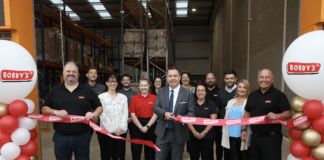The success of discounters such as Aldi is one of the factors that is creating opportunities for wholesalers, as consumers now top-up shop more frequently in local stores.
Price is at the heart of Aldi’s offer and its ability to maintain low prices is unsettling the supermarkets. This ability is underpinned by a disciplined buying strategy. However, the historic business model is ethical, insider Dieter Brandes argues in his book Bare Essentials.
In his 14 years with Aldi, Brandes worked in senior positions and learned from co-founder Theo Albrecht. He says that the primary function of the company’s buying was to ensure that suppliers maintained consistent high quality. A narrow range meant that Aldi could check product quality more rigorously than supermarkets that carried 20 times as many lines could.
While outsiders may believe Aldi gives suppliers a hard time, Brandes argues this is not so. Suppliers get paid promptly, agreed prices are not open to ‘readjustments’, there are no discounts afterwards and the company does not make complaints to seek advantage. This is a short list of the benefits of dealing with Aldi and go alongside the negotiation rules to which the chain works.
[pull_quote_right]Price is at the heart of the Aldi offer and its ability to maintain low prices is unsettling the supermarkets[/pull_quote_right]
Brandes’ rules for successful negotiations are:
1. Avoid having an annual negotiation, which imposes deadlines that may have no connection with your business. Instead, negotiate when issues arise and need to be handled.
2. Treat every negotiation meeting as strategic and let the buyer be solely responsible for the outcome. Management and the buying team need to give the buyer a list of their objectives and then leave the final decision to him or her alone.
3. Buyers should go into meetings with conceptual ideas to achieve, not target margins to win.
4. Buyers should understand that nearly every supplier’s sales volumes can be increased by 20% to 50%. What they need to find out is whether this is really wanted and how to go about growing the business.
5. Turnover should always have priority over margins and both buyer and supplier should focus on the interests of the ultimate customer – the shopper.
6. The principle has to be that the ultimate customer, the consumer, makes up his or her own mind on what to buy. Buyers should watch out for terms and conditions that lead to pressure on volumes and quantities. Volume-based sliding scales and discounts rarely make sense.
7. No agreements should be reached that can only be adhered to at a later date by tying yourself in knots.
8. Both sides should look for logistics cooperation and rationalisation models.
“Putting on the pressure and playing poker are not the best approaches if people want to continue working together,” says Brandes.
At Aldi, cost advantages generate price advantages. But cost advantages are not arrived at by high pressure negotiations. Instead they are driven by volume sales.
Aldi’s tight ranges – 700 in Germany, perhaps 1,200 in the UK – translate into cost savings.
“As the number of variants or items in a product range grows, so too does the level of cost and complexity,” writes Brandes. “Managers make the mistake of thinking that the new variant can be handled within the existing infrastructure without raising the fixed costs of doing business.”
Brandes also says buyers need to beware of sellers demanding that the mix of products stocked by wholesalers be expanded because it would be in the customer’s interest. Watch out for discounts designed to encourage you to increase your range, he says. Also watch out for trade advertising that says: ‘Whatever you do, don’t let anything slip through your fingers.’
Brandes notes that there are very few textbooks dealing with trade negotiations. Good deals are at the heart of success in wholesale and Brandes’ book provides some interesting ideas about how to shape a good deal.
The way that Aldi operates today may be different to the classic model that Brandes describes. However, understanding how the company started in a 1,000sq ft shop in Germany in 1946 and turned into the world-beating operation it is today is worthwhile for any wholesaler. The Aldi toolkit is simple and there will be tools you will want to use.







